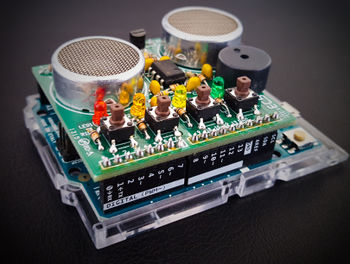Difference between revisions of "Advancing via MUzECS Platform"
| Line 9: | Line 9: | ||
This project currently has several competitors. However, many of the competitors either require constant online connectivity or are very expensive. Therefore, this project is well-suited for high schools with low resources and high schools that do not have constant online connectivity. | This project currently has several competitors. However, many of the competitors either require constant online connectivity or are very expensive. Therefore, this project is well-suited for high schools with low resources and high schools that do not have constant online connectivity. | ||
| − | = | + | = Research Question = |
| − | + | ||
| − | + | Most of the development concerning the MUzECS platform has focused on adding, improving, and fixing features. Therefore, the block-based interface itself hasn't received much attention in terms of design. The design of the dialect has either been based on intuition, or other existing block-based interfaces. This leads us to the question: How can the MUzECS dialect be improved on the basis of learnability? Can the dialect be improved using empirical data? | |
| − | + | ||
| − | + | = Goals = | |
| − | + | ||
| − | + | The end goals of this project consist in the following: | |
| − | + | * To create the standard MUzECS dialect, to which future workers will adhere. | |
| − | + | * Back up every design decision with empirical data from Milwaukee schools using MUzECS, other schools, and other research. | |
Revision as of 23:45, 8 June 2017
Researchers: Gustavo Gratacós and Sam Olson
Mentor: Dennis Brylow
Background
MUzECS is a platform that engages high school students to learn how to program through a block based programming language and music. Students are presented with a microcontroller unit that houses an ultrasonic distance sensor, four buttons, LED lights, and a speaker. This allows students to program a mini-piano, a theremin, their own autonomous songs, and many other things. Students achieve this by using a custom block-based programming language. MUzECS has three distinct versions, one that runs locally on all major platforms, another version that runs on a remote server through a Chrome App, and a Chrome App version that runs locally. The last version is currently in progress.
This project currently has several competitors. However, many of the competitors either require constant online connectivity or are very expensive. Therefore, this project is well-suited for high schools with low resources and high schools that do not have constant online connectivity.
Research Question
Most of the development concerning the MUzECS platform has focused on adding, improving, and fixing features. Therefore, the block-based interface itself hasn't received much attention in terms of design. The design of the dialect has either been based on intuition, or other existing block-based interfaces. This leads us to the question: How can the MUzECS dialect be improved on the basis of learnability? Can the dialect be improved using empirical data?
Goals
The end goals of this project consist in the following:
- To create the standard MUzECS dialect, to which future workers will adhere.
- Back up every design decision with empirical data from Milwaukee schools using MUzECS, other schools, and other research.
